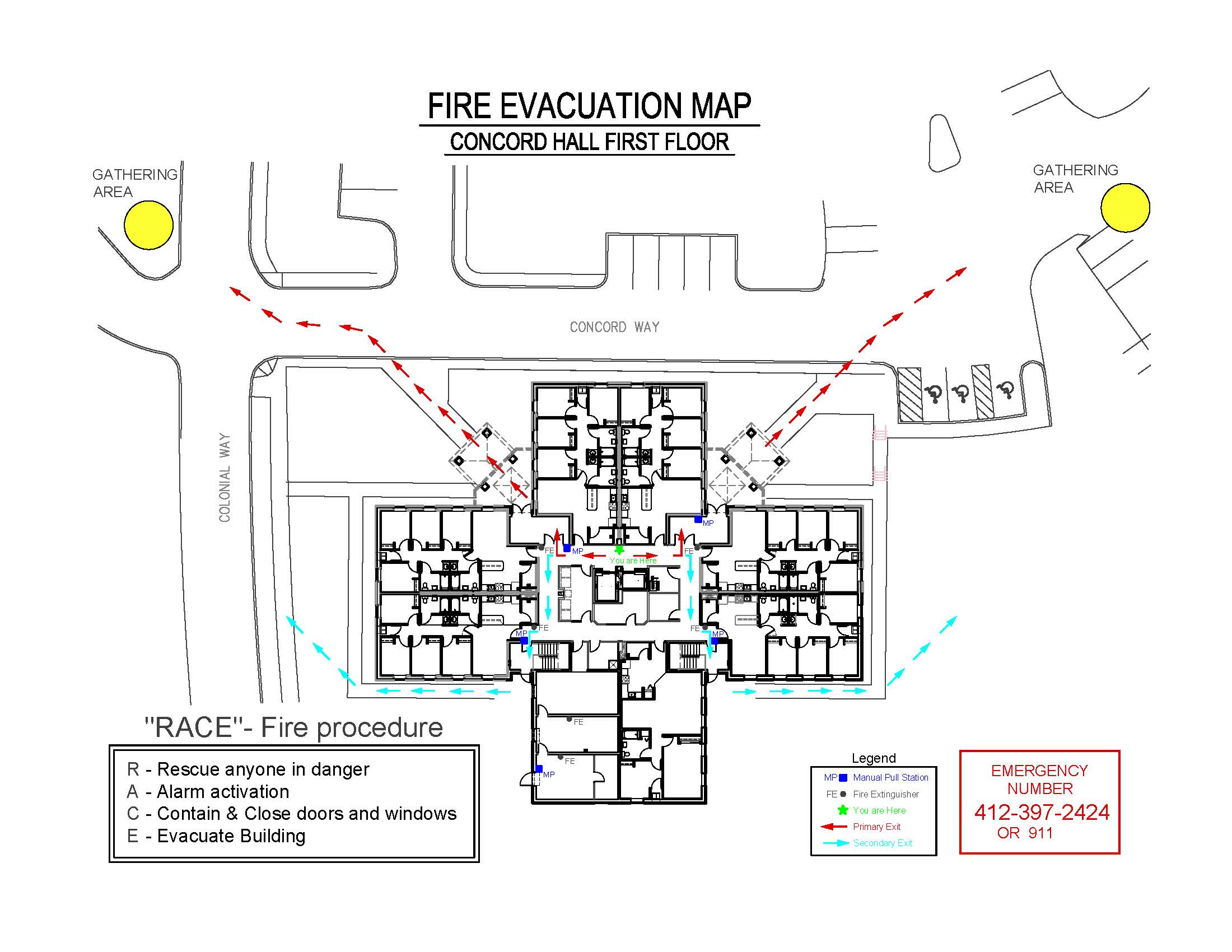Safety Services
Robert Morris University is committed to providing a safe, functional and supportive environment. The safety process has been designed to provide a physical environment free of recognized hazards, manage staff activities to reduce the risk of injuries, and ultimately preserve the safety of everyone at the university.
Please take a moment to navigate through our site for safety related resources right at your disposal such as: comprehensive safety policies, training modules, links and more...
Safety Plans & Policies
- Safety Management
-
- Incident Investigation and Reporting
- Automated External Defibrillators Policy
- Bloodborne Pathogen Policy
- Fall Prevention and Protection
- Aerial Lift Safety Policy
- The Control of Hazardous Energy (Lockout-Tagout) Policy
- Personal Protective Equipment Policy
- Confined Space Entry
- Hearing Conservation
- Contractor's Safety Handbook Policy
- Forklifts and Tow Motors Policy
- Security Management
- Hazardous Materials & Waste Management
- Lab Safety Management
- Fire Safety Management
- Utility Systems Management
Forms & Documents
- Safety Forms & Documents
-
- Equipment Specific Lockout / Tagout Procedure Form
- Fire Alarm Report Form
- Hazardous Chemical Inventory Form
- Lockout / Tagout Authorized Employee Lock Issue Log
- RMU Golf Cart and Service Vehicle - Vehicle Information Form
- RMU Golf Cart and Service Vehicle Safety Policy Acknowledgement Form
- Confined Space Permit
- Hepatitis B Vaccination Declination & Acceptance Form
- Chemical Compatibility Guide
-
Laboratory Safety - Examples of Incompatible Chemicals
Chemical Is Incompatible and Should Not Be Mixed or Stored With Acetic acid Chromic acid, nitric acid, hydroxyl compounds, ethylene glycol, perchloric acid, peroxides, permanganates Acetylene Chlorine, bromine, copper, fluorine, silver, mercury Acetone Concentrated nitric and sulfuric acid mixtures Alkali and alkaline earth metals (such as powdered aluminum or magnesium, calcium, lithium, sodium, potassium) Water, carbon tetrachloride or other chlorinated hydrocarbons, carbon dioxide, halogens Ammonia (anhydrous) Mercury, chlorine, calcium hypochlorite, iodine, bromine, hydrofluoric acid (anhydrous) Ammonium nitrate Acids, powdered metals, flammable liquids, chlorates, nitrates, sulfur, finely divided organic or combustible materials Aniline Nitric acid, hydrogen peroxide Arsenical materials Any reducing agent Azides Acids Bromine See Chlorine Calcium oxide Water Carbon (activated) Calcium hypochlorite, all oxidizing agents Carbon tetrachloride Sodium Chlorates Ammonium salts, acids, powdered metals, sulfur, finely divided organic or combustible materials Chromic acid and chromium trioxide Acetic acid, naphthalene, camphor, glycerol, alcohol, flammable liquids in general Chlorine Ammonia, acetylene, butadiene, butane, methane, propane (or other petroleum gases), hydrogen, sodium carbide, benzene, finely divided metals, turpentine Chlorine dioxide Ammonia, methane, phosphine, hydrogen sulfide Copper Acetylene, hydrogen peroxide Cumene hydroperoxide Acids (organic or inorganic) Cyanides Acids Flammable liquids Ammonium nitrate, chromic acid, hydrogen peroxide, nitric acid, sodium peroxide, halogens Fluorine Everything Hydrocarbons (such as butane, propane, benzene) Fluorine, chlorine, bromine, chromic acid, sodium peroxide Hydrocyanic acid Nitric acid, alkali Hydrofluoric acid (anhydrous) Ammonia (aqueous or anhydrous) Hydrogen peroxide Copper, chromium, iron, most metals or their salts, alcohols, acetone, organic materials, aniline, nitromethane, combustible materials Hydrogen sulfide Fuming nitric acid, oxidizing gases Hypochlorites Acids, activated carbon Iodine Acetylene, ammonia (aqueous or anhydrous), hydrogen Mercury Acetylene, fulminic acid, ammonia Nitrates Sulfuric acid Nitric acid (concentrated) Acetic acid, aniline, chromic acid, hydrocyanic acid, hydrogen sulfide, flammable liquids, flammable gases, copper, brass, any heavy metals Nitrites Acids Nitroparaffins Inorganic bases, amines Oxalic acid Silver, mercury Oxygen Oils, grease, hydrogen, flammable liquids, solids, or gases Perchloric acid Acetic anhydride, bismuth and its alloys, alcohol, paper, wood, grease, oils Peroxide, organic Acids (organic or mineral), avoid friction, store cold Phosphorus (white) Air, oxygen, alkalis, reducing agents Potassium Carbon tetrachloride, carbon dioxide, water Potassium chlorate Sulfuric and other acids Potassium perchlorate (see also chlorates) Sulfuric and other acids Potassium permanganate Glycerol, ethylene glycol, benzaldehyde, sulfuric acid Selenides Reducing agents Silver Acetylene, oxalic acid, tartartic acid, ammonium compounds, fulminic acid Sodium Carbon tetrachloride, carbon dioxide, water Sodium nitrate Ammonium nitrate and other ammonium salts Sodium peroxide Ethyl or methyl alcohol, glacial acetic acid, acetic anhydrite, benzaldehyde, carbon disulfide, glycerin, ethylene glycol, ethyl acetate, methyl acetate, furfural Sulfides Acids Sulfuric acid Potassium chlorate, potassium perchlorate, potassium permanganate (similar compounds of light metals, such as sodium, lithium) Tellurides Reducing agents
Chemical Inventory & SDS Database
Click here to for the Chemical Inventory & SDS Database.
Safety Tips
- Safety Tips
Safety Links
- Safety Links, OSHA, and NIOSH
Safety Committee
- Safety Committee Members
-
Tucker DeCasere
Ashley Deahl
Paul Dewey
Mary Fecko
Tim Goldinger
Samuel Goodge
David Hanson
Christopher Janicki
Beth Kampsen
Jamey Koss
Jeffrey Mitchell
Laura Todd
Safety Education Suite
- Required University Wide Training
-
The following training modules are required for all University Staff and Faculty.
- Department Specific Training
-
Please see supervisor regarding what training modules are required for your area or job title.
- Automated External Defibrillators (AED) Program
-
AEDs are located in every building. As with any medical emergency you should initiate emergency response services by immediately contacting RMU Police 412-397-2424 and/or local services at 911.
- AED Campus Map
- Printable List of AED Locations
- American Heart Association Self-Serve video - Basics of Using an AED
- American Heart Association Self-Serve Video - CPR Hands Only
- Automated External Defibrillators (AED) Policy
- Stretching & Exercise Guides
Injury / Incident Reporting Documents
- Student and Visitor Forms
- Employee Forms
- Physician's Panels
Campus Emergency Resources
- How To Respond
-
- Fire Safety
-
- Campus Fire Evacuation Map Example
-

For More Information, Contact:
Tim J. Kirsch, CIH
Senior Director,
Capital Projects and Safety
Facilities Management
kirsch@rmu.edu
412-397-6282 Phone
412-397-6474 Fax
Jamey Koss
Coordinator,
Capital Projects and Safety
Facilities Management
koss@rmu.edu
412-397-5978 Phone
